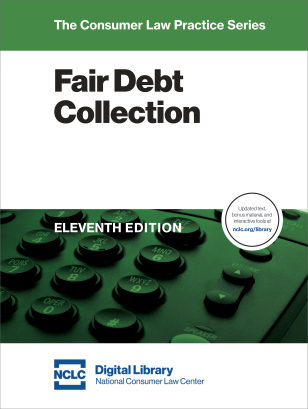Much focus is placed on the federal Fair Debt Collection Practices Act (FDCPA), and too often state debt collection legislation is given insufficient notice. Such legislation can regulate originating creditors and other collectors not covered by the FDCPA and can add important substantive requirements not found in the FDCPA. For example, a debt buyer or collector’s failure to comply with a state licensing statute can lead to significant consumer claims.
The legislation can also offer rights to consumers to help them defend collection lawsuits, such as limiting the tolling of the statute of limitations period or requiring debt buyers to have certain evidence before proceeding with a case.
Other advantages of using state debt collection statutes include keeping out of federal court where state court is preferred, a longer statute of limitations than the FDCPA, and in some cases stronger remedies.
Each state’s debt collection legislation is summarized at NCLC’s Fair Debt Collection Appendix D. State debt collection statutes and related case law are analyzed at Fair Debt Collection Chapter 9.
Recent Amendments to State Debt Collection Statutes
Arkansas: Civil penalties for failure to obtain a license “shall be the only consequences of and remedy for the failure of a collection agency to obtain a license …” Ark. Code Ann. § 17-24-103.
California: Collectors must notify credit reporting agencies when it receives notice from a debtor alleging identity theft, and prescribes a timeline for review. Cal. Civ. Code § 1788.18(d) and (g). A creditor is forbidden to sell a debt if it has received notice that a debtor is alleging identity theft. Cal. Civ. Code § 1785.16.2.
Connecticut: The definition of collection agency now includes private collectors of federal income tax and other federal tax debts. Conn. Gen. Stat. § 36a-801(2). The amendment also prescribes the evidence debt buyers must produce when suing on a debt, prohibits debt buyers suing on a debt that it knows or reasonably should know is time-barred. Once a debt is time-barred, a subsequent payment or affirmation does not extend the time during which the debt buyer may sue. Conn. Gen. Stat. Ann. Public Acts 16-65 § 53.
Illinois: A collection agency or debt buyer is not liable under the statute if it can demonstrate compliance with comparable FDCPA provisions. 225 Ill. Comp. Stat. 425/60. Definition of collection agency now specifies one who collects on behalf of himself or herself or others. 225 Ill. Comp. Stat. Ann. § 425/2.
Maine: A debt collector may not collect pursuant to a payment or settlement agreement until the debtor has been provided with a written agreement. Me. Rev. Stat. Ann. tit. 32 § 11013(6). Collector may not initiate action on a debt that it knows, or reasonably should know is time-barred. Consumer debts are time-barred six years after consumer’s last activity on the debt, unless a shorter limitations period is provided under the laws of this state. Once a limitations period expires, subsequent payment or affirmation of the debt will not revive or extend the limitations period. Me. Rev. Stat. Ann. tit. 32 §§ 11013(7) and (8).
Michigan: Definition of collection agency amended to delete indirectly collecting debts. Mich. Comp. Laws Ann. § 339.901(1)(b). Also added to list of exceptions from the statute: a forwarding agency, that acting on behalf of a creditor or lender, forwards a claim, collection or repossession to a licensed collection agency or a person whose collection activities are excluded or exempted. § 339.901(1)(b)(xii).
New Hampshire: Debt buyers explicitly covered. N.H. Rev. Stat. Ann. § 358-C:I(VIII).
West Virginia: Violation to contact represented consumer only if contact made more than 72 hours after receipt of written notice, sent to collector’s registered agent (or principal place of business if there is no registered agent) stating that attorney represents consumer as to this specific debt, and giving name, address and phone number of attorney. W. Va. Code § 46A-2-128(e).

